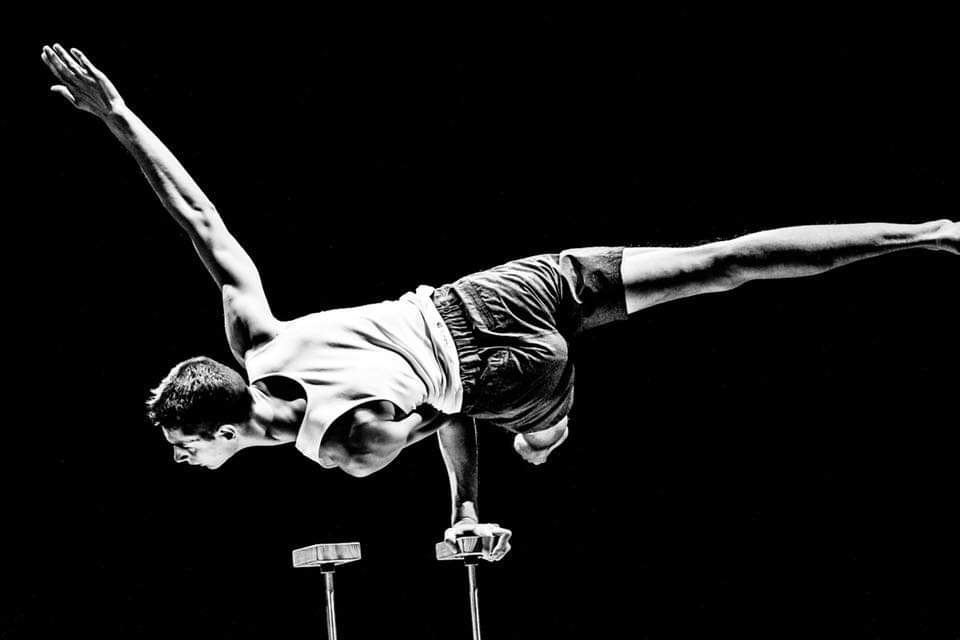Flying high: from circus school to a maths degree

Grover Lancaster-Cole. Photo: Nic Vevers/ANU
It’s not a massive leap to go from circus performer to mathematics graduate, says Grover Lancaster-Cole, from the ANU Mathematical Sciences Institute.
However, it’s certainly not the usual trajectory to university.
Grover spent his childhood travelling with his parents, who are both circus performers. He then spent his high-school years training and performing with the Flying Fruit Fly Circus, a world-renowned youth circus based in regional New South Wales – but now he is graduating with an honours degree in mathematics.
“When I was growing up, my parents would spend up to nine months at a time working and touring around Europe.
“So when I was a kid, I followed them around. That's just how it was, I didn’t see it as weird or anything.”
Later, he and his brother each also decided to join the circus, and Grover took up aerial rope, among other acrobatic disciplines.
“Most of my life was school and training,” Grover says.
After high school, Grover worked as a circus performer in Australia, Austria and the Netherlands for a year before deciding to study a science degree at ANU, focusing on maths and physics courses.
“I told myself: acrobatics is just physics,” Grover says.
“Then, I sort of fell in love with the maths part.
“I liked maths at school, but when I came to uni I realised that really it's about logical reasoning. You're actually figuring something out for yourself.
“I think that's what really hooked me.”

Grover Lancaster-Cole performing. Photo: Ian Sutherland
Grover received a Co-Lab Honours Grant at the beginning of his honours project this year, which he has just completed. The Co-Lab is a 15-year partnership between the Australian National University and the Australian Signals Directorate (ASD). The Honours Grant helps to financially support students while studying, but also connects them with new networks, career opportunities and training.
His honours year saw Grover unearth a new proof in the representation theory of certain objects known as ‘quivers’. This is an area of abstract algebra in which a certain subset of the Coxeter-Dynkin diagrams appear.
“I was interested in how to rephrase quiver representation theory in such a way that all the Coxeter-Dynkin diagrams show up,” Grover says.
That involved investigating a new paper on the topic, figuring out an alternative proof of the result, and showing examples of how it works in different cases − thus expanding the mathematical knowledge in this area.
After months of figuring out the answers to his puzzle, there was just one case in Grover’s argument that he couldn’t quite place. So Grover’s supervisor suggested that he speak to the author of the paper that this work was based on, who happened to be an ANU alumnus.
“It actually turned out that the same question had come up for him in his more recent work, so we talked about it, and I was able to fill in that missing piece and complete my thesis,” Grover explains. “In fact, it meant I could say something slightly stronger than I had originally planned.”
These connections and collaborations are a key part of why Grover loves maths.
“I see maths as a social activity,” he says. “Because the culture is very encouraging of collaboration and talking to each other.
“I've learned so much just by talking to my friends.”
But it's also a creative process, he says.
“It's not as simple as you're telling me how to do it, and then I just regurgitate it. You've got to construct your own solution to this problem. And then you've got to prove that it works,” Grover says.
Because there’s more than one way to make a correct mathematical proof, mathematicians can create something beautiful.
“I see maths as more of an art than a science,” he says. “Aesthetically, you can appreciate a nice proof for its elegance.”
Elegant like the art of an acrobatics performance maybe?
With his family’s continued involvement in the circus, Grover still teeters in and around the world of his first passion.
“I do miss it,” he admits. “When I go visit Mum and Dad, I have a go on their flying trapeze. I do still enjoy it.
“But then I come back here… and everything is maths again.”
Are you researching honours topics that have real-world impact? The 2024 Co-Lab Honours Grant is now open for applications.
